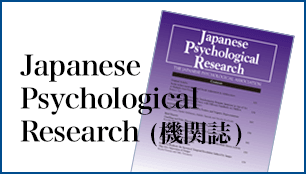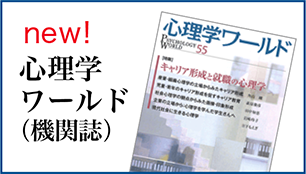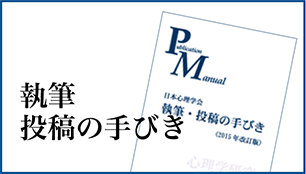- HOME
- 刊行物のご案内
- Japanese Psychological Research
- 2021年刊行予定 Japanese Psychological Research 特集号 (Special Issues of JPR)
刊行物のご案内
2021年刊行予定 Japanese Psychological Research 特集号 (Special Issues of JPR)
"Narrative Based Research and Practice in Psychology" (心理学におけるナラティヴ実践研究)一般公募について
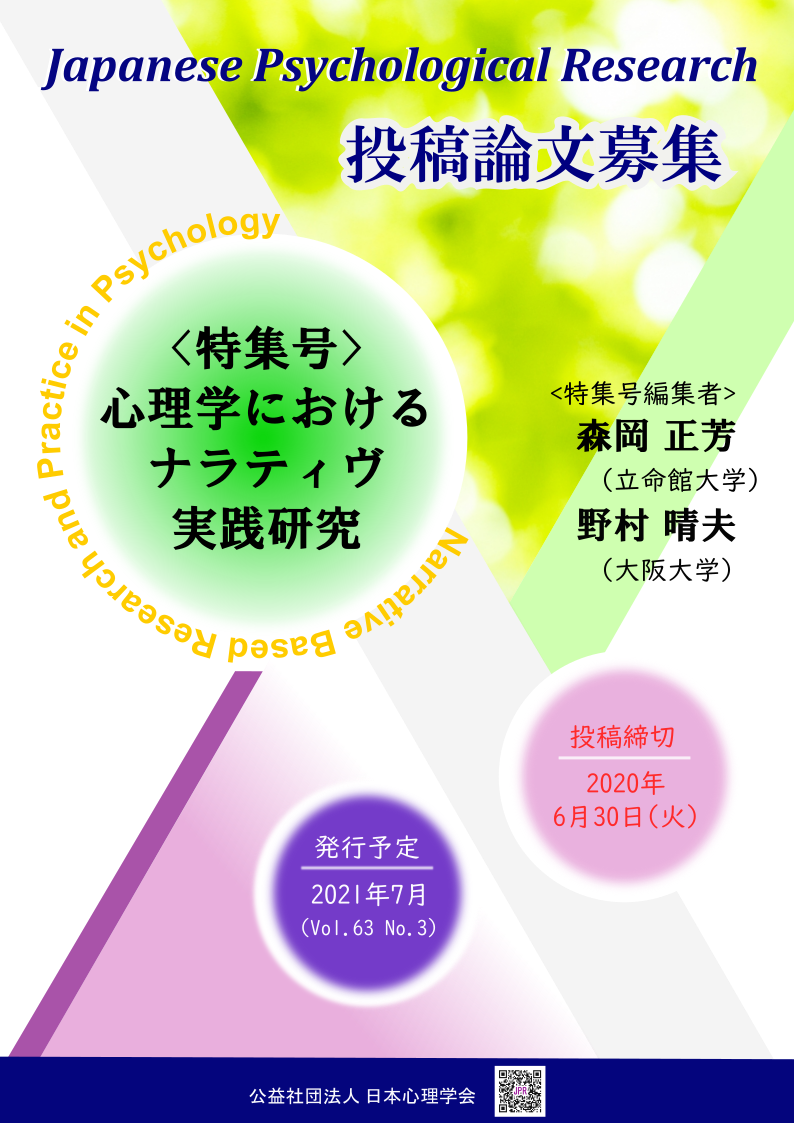
- テーマ:
- "Narrative Based Research and Practice in Psychology"
- (心理学におけるナラティヴ実践研究)
- 編集者:
- 森岡 正芳(立命館大学)
野村 晴夫(大阪大学) - 発行予定:
- Japanese Psychological Research, Vol.63,
No.2(2021年4月号)【No.3(2021年7月号)】 - 投稿締切:
2020年4月30日(木)【2020年6月30日(火)】- 投稿先:
- https://jpa.iap-jp.org/jpr/
概要
この特集号は,心理学における研究と実践におけるナラティヴ思考モードを探求するものです。ナラティヴとは,個人の体験の意味を伝える言語形式による思考のモードです。ナラティヴは,個人に生じた出来事を選び編集し筋立てる形式に特徴があります。ジェローム・ブルーナーは,論理実証主義に基づく科学的心理学と対比しうるもう一つの心理学として,ナラティヴ思考モードの心理学を導入しました。1980年代より,ライフストーリーや伝記的手法を用いた心理学や,心理社会的支援,心理療法などで国際的に広がり,同時に文化の固有性に根差した研究の深まりを見せています。
心理社会的支援の場では,喪失,病,災害や暴力といった人生の厳しい出来事を被った当事者が,自らの体験を語りなおすプロセスを通じて,自己感覚の再構築を促進しうることが認められています。ナラティヴ実践は主体感覚の回復をもたらします。
個人の筋立てに沿って,人生の出来事と出来事をつないでいく営みによって作られていくストーリーの行為は,自己の体験を他者と共有することを促進します。ナラティヴは,自己内そして自己他者の間で交わされる対話として,社会的に構成される微視的なプロセスが伴います。意味構成のプロセスは,社会的文脈の中で確かめられます。最近では,会話についてマイクロ分析を通じて,意味の微細な動きをとらえる研究も盛んになってきています。
ナラティヴ研究はナラティヴ医学や,心理社会的支援,心理療法に限らず,広いテーマを包含します。人の発達,アイデンティティ形成,キャリヤ発達,世代継承,高齢者の回想におけるライフストーリー研究はもちろん,生活の様々な現場において試みられている質的研究,さらに当事者研究などが話題を集めています。
この特集は,心理学におけるナラティヴ実践研究のすべてのタイプの研究を広く求めるものです。またナラティヴの視点に関わる方法論の体系的な展望や概説なども歓迎します。提出稿の締め切りは2021年の4月末 【6月末】です。
詳細はこちらをご覧ください。
※特集号へご投稿の際は,投稿時に必ず特集号への投稿論文であることを明記してください。
Call for Papers: Special issue of Japanese Psychological Research
"Narrative Based Research and Practice in Psychology" Edited by Masayoshi Morioka and Haruo Nomura
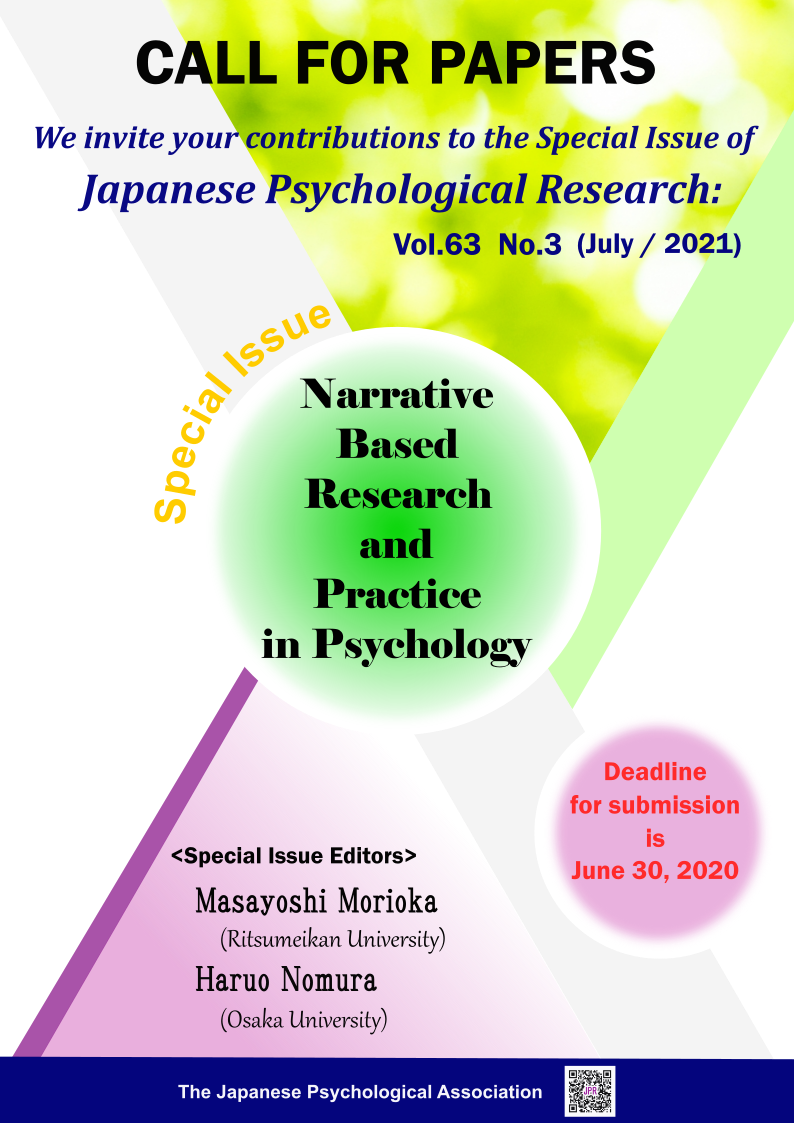
- Title:
- "Narrative Based Research and Practice in Psychology"
- Editors:
- Masayoshi Morioka & Haruo Nomura
- Publication:
- JPR Vol.63,
No.2 (April, 2021)[No.3 (July, 2021)] - Deadline:
April 30, 2020[June 30, 2020]- Submission:
- https://jpa.iap-jp.org/jpr/
The purpose of this issue is to investigate the narrative mode of thought within the context of psychological research and practice. Narratives are a form of language that communicates the meanings of personal experiences. They consist of personal events selected and authored through enplotment. Jerome Bruner introduced the concept of the narrative as a mode of psychology in contrast to the paradigmatic mode of scientific psychology. Since the early 1980s, psychology research using life stories and biographical methods, psychosocial support, and psychotherapy has spread to become universal and has deepened insights into culture-specific issues.
In the field of psychosocial support, the process of re-telling severe life events such as attachment loss, disease, disaster, and violence, can facilitate reconstruction of a person’s sense of self. This narrative practice can recover the sense of agency.
The act of story making, by reconnecting personal life events according to a personal plot, encourages people to share their experiences with others. Narration involves microprocesses socially constructed as both self-to-self and self-to-other dialogues. In other words, people examine the social context during the narration process. Recently, numbers of studies articulating the semiotic activity of the narration process using micro conversation analysis have increased.
Narrative based research is not exclusive to themes from clinical fields such as narrative medicine, psychosocial support, and psychotherapy. It also includes themes from life story research in the field of human development, retrospectives of elderly people, and from studies of identity formation, career development, and generativity. Furthermore, narrative based research includes qualitative psychological research conducted in various life situations, including layperson centered studies.
This special issue aims to publish a wide range of papers addressing any type of narrative based research and practice in psychology. Systematic or descriptive review articles regarding the direction or methodology of narrative-based psychology are also welcomed.
Click Here For More Information!


